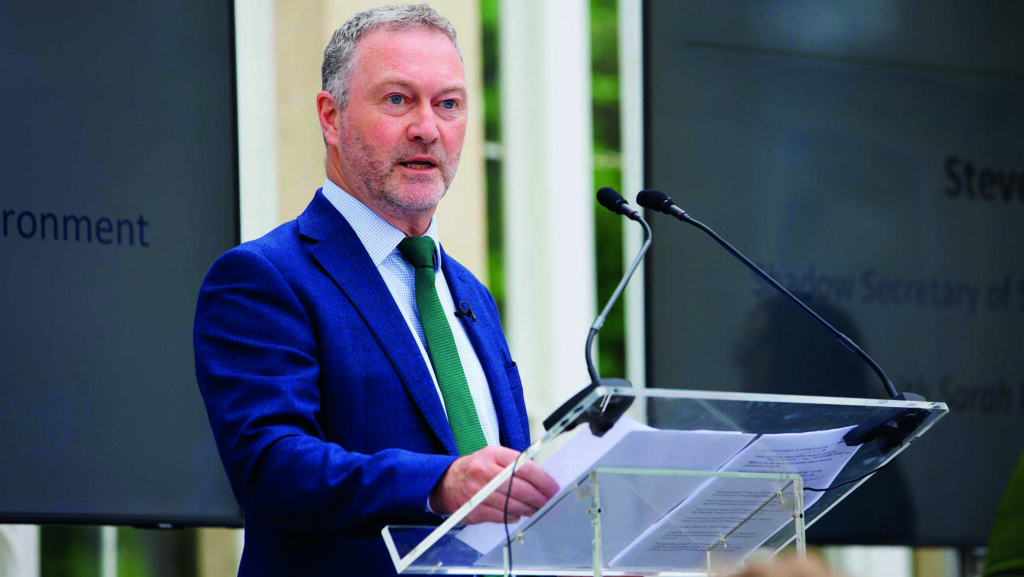Defra Secretary Steve Reed has confirmed that new rules governing fairness in the pork supply chain will come into force this spring, as he faces a farming audience at the Oxford Farming Conference today.
Mr Reed will be looking to shift attention onto Labour’s long-term New Deal for Farming, as he, no doubt, braces himself for a barrage of questions on the far-reaching impact on farmers of the November Budget. The Defra secretary is expected to face a backlash against the government’s inheritance tax reforms, in particular, during his first appearance at the flagship farming event.
He will attempt set out how the Government will work with farmers to deliver a ‘profitable farming sector and unlock rural growth’, including a ‘cast iron commitment to food security while introducing reforms to help farmers diversify their income streams to support them during poor harvests’.
As part of the Plan for Change, the Defra Secretary will announce a series of reforms, delivering on the Government’s New Deal for Farmers including on ‘delivering a fair supply chain’.
The new government has picked up discussions with the NPA and others over the legislation on contractual practice that was halted, under the previous government, by the election. Mr Reed will confirm today that new rules for the pig sector will come in this spring, ‘ensuring contracts clearly set out expectations and changes can only be made if agreed by all parties’.
Similar regulations for eggs and fresh produce sectors will follow with the government ready to intervene with other sectors if needed.
He will also announce, as part of the New Deal:
- Backing British produce: For the first time ever, the Government will monitor food currently bought in the public sector and where it is bought from. This is a significant first step to deliver on a manifesto pledge and make it easier for British farmers to win a share of the £5 billion spent each year on public sector catering contracts.
- Using planning reforms to support food production: Ensuring reforms make it quicker for farmers to build the buildings, barns and other infrastructure they need on their farms to boost food production. Updates to the National Planning Policy Framework in December 2024 mean that planning authorities should be more likely to approve applications for renewable or low carbon energy.
- Diversifying income streams: Helping farmers make additional money from selling surplus energy from solar panels and wind turbines by accelerating connections to the grid and support them during difficult harvests and supply shocks.
- Protecting farmers in trade deals: The government will uphold and protect the UK’s high environmental and animal welfare standards in future trade deals.
As part of the longer-term plan, Mr Reed will set out his vision for the future of farming in three parts – food production, business resilience and nature restoration:
“The primary purpose of farming has – and always will be – to produce the food that feeds the nation. Too many policymakers in Whitehall lose sight of that fact. This Government is putting food production firmly back on the agenda,” he is expected to say.
“We will work in partnership to achieve our vision for the farming sector. First, a sector whose primary purpose is food production. Secondly, a sector where farmers can access diverse income streams to make a fair profit and ensure their business remains viable in times of challenge.
“And thirdly, a sector which supports farmers to restore nature – the foundations of sustainable food production.
“It is only through pursuing all three that we will achieve long-term food security.”
Devastating inheritance tax changes
NFU President Tom Bradshaw said there are ‘positive elements to this announcement’, but said it ‘fundamentally fails to recognise that the industry is in a cash flow crisis with the lowest farmer and grower confidence ever recorded’ and also reiterated the impact of the budget on farmers.
“Devastating inheritance tax changes, national insurance hikes, crippling cuts to direct payments and delays to environmental schemes mean many businesses won’t survive to benefit from the ‘New Deal’,” he said.
“It’s great that government thinks farming and growing businesses should be more profitable and sustainable in the long-term. It’s also good to hear the government say the primary role of farmers and growers is to produce food, but how is it going to ensure food production is profitable when thousands of farmers and growers are questioning whether they’ll still be in the industry in the next year?”
“The government must now face up to the reality of the fierce policy headwinds and challenging market conditions the industry is facing into and act to secure the future of British farming. Its first priority as a matter of urgency must be to pause and consult on changes to Agricultural and Business Property Relief and review the delays and challenges to agri-environmental schemes.”
“To have a genuine reset moment with farmers and growers after the inflationary budget, all of these issues need to be addressed.”




